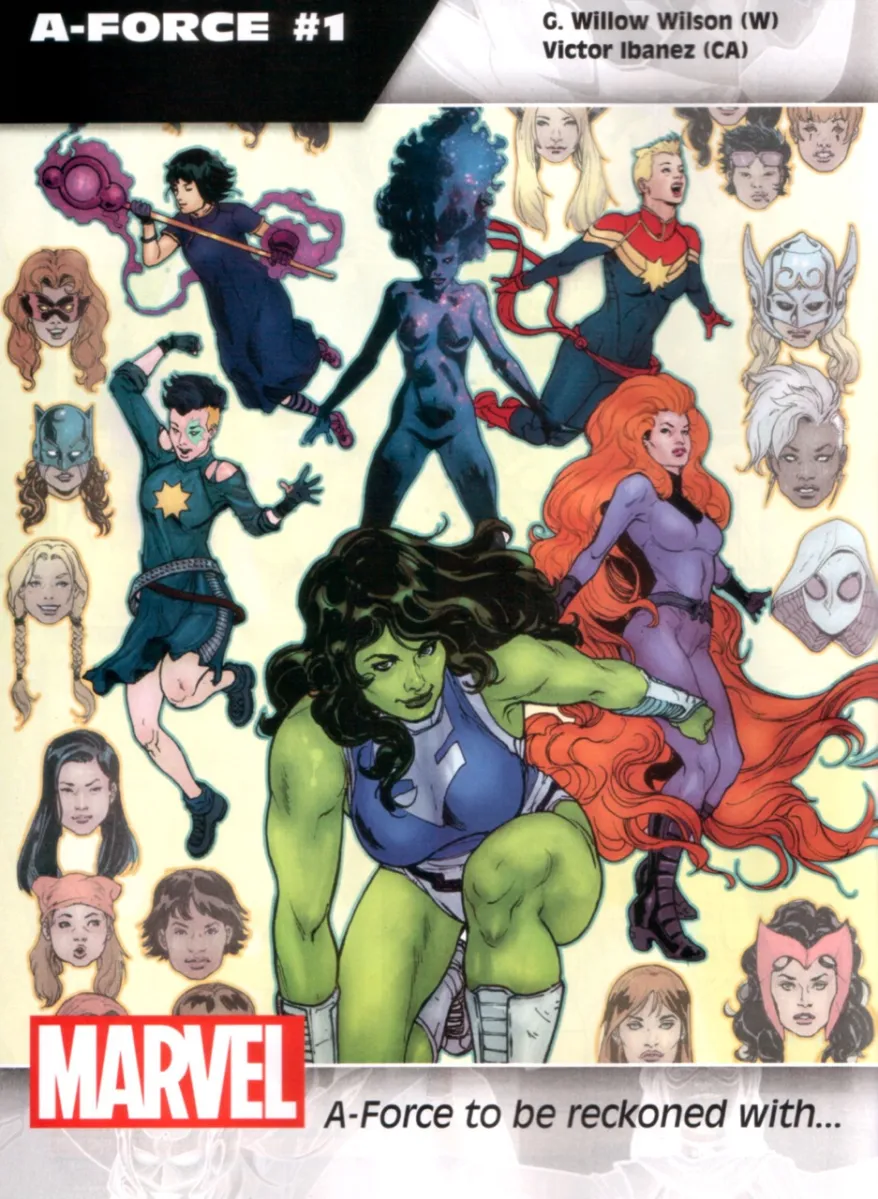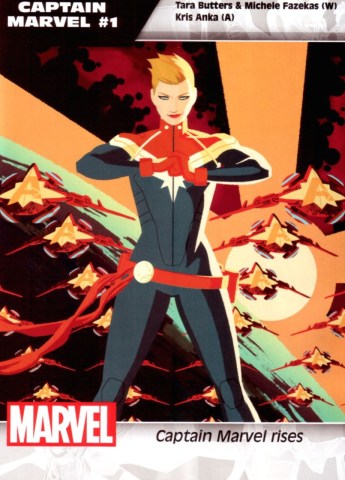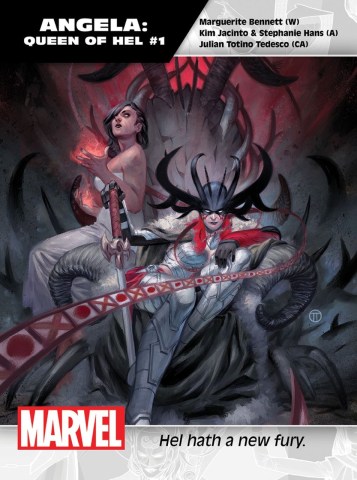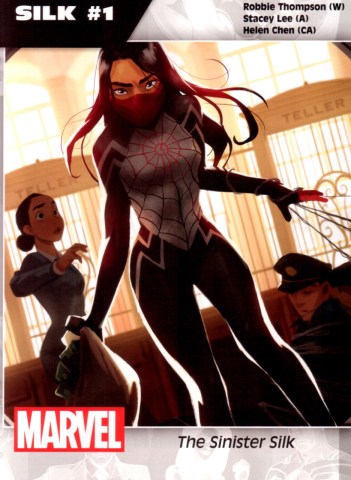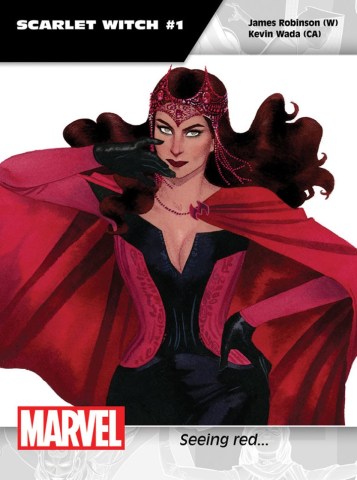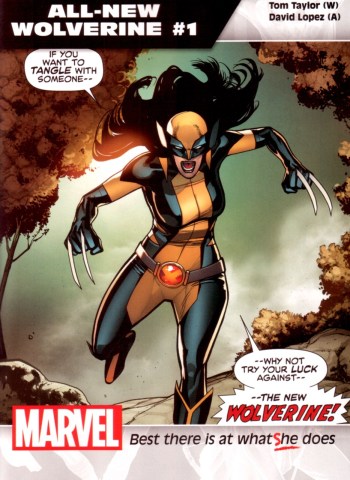If you follow comic book news, chances are you’re already aware of Marvel’s upcoming All-New, All-Different publishing line relaunch, seeing 45+ new series starting this fall. Although the announced titles—ranging from Scarlet Witch and a female Wolverine both receiving their own solo series to the return of A-Force and Ms. Marvel—continue Marvel’s push towards greater cultural representation, the new creative teams working on these series fail to reflect this.
While only writers and pencillers for the series have been announced (missing out inkers, colourists, letterers and some cover artists) the initial solicitations listed 81 different male creators compared to just 8 women. That’s not even enough for a decent Megaton team. And despite the additional female-led series that were announced at San Diego Comic Con last week (including Unbeatable Squirrel Girl and a new Blade series with female co-lead) the numbers only got worse—4 additional male creators compared to just 1 woman.
Although the issue I’m highlighting here is the company’s failings in gender representation—because, for obvious reasons, it’s the easiest form of inclusion to spot when browsing lists of names—that isn’t to suggest that Marvel is performing any better in terms of ethnicity, gender identity or sexuality. However, Marvel has spearheaded its championing of diversity through its female characters—from the introduction of the new Ms. Marvel to Jane Foster adopting the Thor mantle and even the upcoming Captain Marvel movie. Diversity has been used as a marketing strategy to engage with female readers first and foremost, but this commitment to representation is yet to carry over to the company’s hiring processes.
While it’s all too easy to forget about creators and focus on characters in comics, these hiring decisions are intentional, important and merit consideration. Across the 49 announced books there are 116 creator credits listed, 106 for men and only 10 for women. Those women are –
Marguerite Bennett (writer of Angela: Queen of Hel)
Tara Butters and Michele Fazekas (co-writers of Captain Marvel)
G. Willow Wilson (writer of A-Force and Ms. Marvel)
Helen Chen (cover artist for Silk)
Stephanie Hans (co-artist for Angela: Queen of Hel)
Erica Henderson (artist for Unbeatable Squirrel Girl)
Stacey Lee (artist for Silk)
Sara Pichelli (artist of Spider-Man)
Of these women, the majority (Bennett, Wilson, Hans, Henderson, Lee, Pichelli) have all been rehired to continue working on books that they were already part of before the relaunch. Those that haven’t been employed by Marvel’s publishing line before (Butters, Chen, Fazekas) have also been hired to work on pre-existing series that have experienced a change in talent. Butters and Fazekas replace Kelly Sue Deconnick as Captain Marvel scribes, leaving Chen as the only woman taking over from a male creator—Dave Johnson.
In real terms, this means that women at Marvel aren’t being given new opportunities or promotions to work on higher-profile or additional series compared to their male counterparts. The numbers also suggest that while women are allowed to tell stories about women(to an extent), they have no role to play in telling “universal” stories that extend beyond “minority” readers.
Across the 12 female-led series, 23 different male creators are listed but across the 21 male-lead series (and 16 team books) only 1 female creator is mentioned—Sara Pichelli, continuing to draw the adventures of Miles Morales in Spider-Man. There are at least 20 new series being launched by Marvel that don’t serve as continuations of existing stories but there aren’t any women listed as working on any of them. (Only 3 of these are “female-orientated” series, All-New Wolverine, Blade, and Scarlet Witch.)
With no women in the mix, these opportunities are exclusively going to male creators—both upcoming and established at the company. Creators such as Al Ewing, Greg Land, Gerry Duggan, Dennis Hopeless and Frank Barbiere have all been promoted to new or additional series—positioning them as some of Marvel’s top talent as the likes of John Hickman, Rick Remender and Deconnick focus on independent work. In contrast, women who work in comics aren’t receiving the same opportunities.
For example—Silk artist, Stacey Lee, returns to her previous role while Silk writer, Robbie Thompson, also receives an additional two series across the line. Elsewhere, the amazing Marguerite Bennett has simply graduated the sole writer of Angela’s new series (following the departure of Kieron Gillen). Other women that have been previously employed by Marvel don’t even feature at all.
So, to summarize, representation of women in Marvel’s relaunch is decidedly poor when it comes to female creators. Luckily, there are a number of really easy ways to remedy this issue thanks to the real wealth of talented women—even within Marvel’s recent series—to be called upon. All Marvel needs to do is start thinking beyond the status quo of all-male teams, especially for its diversity-focused and female-led series.
The classic argument routinely used to shoot down demands for greater gender parity within comics is that there are far fewer high profile women making comics—however this is undeniably down to leading publishers’ reluctance to foster more talented women. As discussed, only 3 of Marvel’s latest female creators haven’t been previously employed by Marvel before—Helen Chen, Tara Butters and Michele Fazekas. Chen is a smart hire for Silk’s covers following her work on Gotham Academy but Butters and Fazekas earned their place as Captain Marvel writers—outside the medium itself.
While I can’t wait to read Captain Marvel, it’s frustrating to see that the only new women with a meaningful influence over a series in Marvel’s relaunched line have very little experience in the comic book industry between them. When there are so many amazing female writers and artists struggling to land major projects in the industry, to see the only new writers being hired to have come from another medium entirely is obviously disheartening.
It’s already hard enough for women to access new opportunities in the comics industry, to the extent that Janelle Asselin runs a regular column at Comics Alliance, Hire This Woman, to spotlight women in the industry.
Marvel has the means to reach out to “undiscovered” diverse creators and put them on important books and it needs to do this if it wants to continue to appeal to a wide range of readers. It appeared to be laying the foundations for this earlier in the year with creators like Noelle Stevenson and Kelly Thompson—Noelle having contributed to Thor Annual #1 and currently writing the Secret Wars’ Runaways series and Kelly co-writing Captain Marvel and the Carol Corps with Kelly Sue Deconnick—but neither feature on the list of new series.
Turning to more established women that Marvel has recently worked with, the company has also employed Kathryn Immonen, Marguerite Sauvage and Alti Firmansyah for regular work so far this year. In addition to these creators, Marvel has also collaborated with numerous women for anthology issues, variant covers and more. When you include prominent DC artists such as Annie Wu, Ming Doyle and Becky Cloonan who have all recently contributed to Marvel comics, you realise just how many women Marvel is actively excluding when developing new series.
This isn’t just a case of ‘we hired the best people for the job,’ this is exclusion on a significant scale. It’s excluding both Marvel’s current female creators by denying them chances to progress and the women previously employed not receiving subsequent work. It’s ignoring the writers and artists currently working on major series at other publishers as well as the plethora of indie talent ready to be given a step up. Simply put, women receiving only receive 10 creator credits across Marvel’s entire relaunch isn’t good enough.
While the number of women involved may marginally grow beyond the current 9 (as Marvel still has a few remaining series to announce and they promised greater diversity amongst them) the culture that has lead to inequality feels truly ingrained. Although Noelle Stevenson or Kelly Thompson may end up receiving their own series to write after all, that won’t change the fact that no female creators are involved with any of key Avengers or X-Men series that govern the whole Marvel universe. And while Unbeatable Squirrel Girl survived Secret Wars, the book didn’t feature in the previews guide that Marvel circulated through comic book shops promoting their new series—which won’t help its chances. Incremental changes may shift the numbers around slightly, but it won’t change the fact that women in the industry face entrenched marginalization at Marvel.
Regardless of whether or not Marvel decides to champion diversity amongst the people who produce their books (as it has amongst the characters that feature in them), the comic book industry is irrevocably shifting towards an ever broader and more diverse landscape. With comics now available digitally, indie publishers producing specifically diversity-orientated series, and social media platforms creating spaces for communities to develop—comic books as a boys’ club is over.
These readers are the future writers, artists and editors of comic books and the harder companies try to maintain the current status quo, the harder it’ll be to convincingly promote themselves as champions of diversity—regardless of whoever happens to be Thor that year.
Adam Sorice is a literate graduate turned grown-up who writes about pop culture when he’s not describing himself in the third person. His writing engages with all the key feminist icons of our time: Lady Gaga, Sailor Moon, Elsa from Frozen and, naturally, Thor. To read more of his work, check out his blog or follow him on Twitter.
—Please make note of The Mary Sue’s general comment policy.—
Do you follow The Mary Sue on Twitter, Facebook, Tumblr, Pinterest, & Google +?



